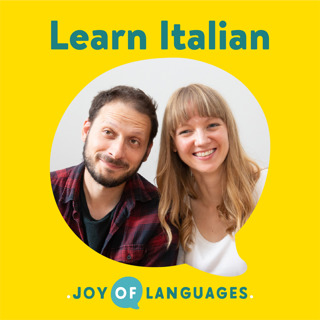
55: Che cosa puoi fare a Milano?
We're afraid we're not currently offering in person immersions in Italy, but we do have a fantastica online Italian school! You can find out more here: https://joyoflanguages.online/italian-school Subscribe to our new Youtube channel: https://www.youtube.com/@joyoflanguages.italian?sub_confirmation=1 Get the bonus materials from today's episode: https://italian.joyoflanguages.com/podcast/things-to-do-in-milan *Correction - in the episode, Katie said "15th", the vacation is actually on the 14th (14 - 17 December) Today's words: Che cosa puoi fare a Milano? = What can you do in Milan? Che cosa = What Puoi = You can Fare = do A Milano = in Milan Puoi visitare il duomo e salutare la Madonnina = You can visit the cathedral and say hello to "la Madonnina", which is the little golden statue of The Virgin Mary at the top of the cathedral. Puoi = You can Visitare = visit il duomo = the cathedral e = and salutare = say hello to la Madonnina = the little Virgin Mary statue. Panino = sandwich (literally means small bread). Pane = bread ino = word ending that means "small" Puoi visitare il castello sforzesco = You can visit the Sforzesco Castle. Con un parco bellissimo = With a beautiful park. Puoi mangiare piatti tipici del Nord Italia, come il risotto = You can eat typical dishes of Northern Italy, like risotto. Puoi = you can Mangiare = eat Piatti = dishes Tipici = typical Del = of the Nord = North Italia = Italy Come = like il risotto = the risotto Puoi mangiare il panettone e bere il Prosecco = You can eat Panettone (a typical Italian Christmas cake, which is a Milanese speciality) and drink Prosecco. Puoi fare "aperitivo" = You can do "aperitivo" (a cocktail with all you can eat nibbles)
21 Loka 20187min

54: 6 Essential Italian Conversation Phrases (no more awkward silences!)
You want to practice speaking Italian but... what if you forget a word? Or you don't understand? Here are 6 Italian phrases to keep the conversation going. Learn about our Online Italian School and get a free mini lesson every week: https://joyoflanguages.online/italian-school Subscribe to our new Youtube channel: https://www.youtube.com/@joyoflanguages.italian?sub_confirmation=1 Get the bonus materials for this episode: https://italian.joyoflanguages.com/podcast/italian-conversation-phrases Today's Italian words and phrases Come si dice questo in italiano? = How do you say this in Italian? Come = how Si dice = one says Questo = this In italiano = in Italian Che cosa vuol dire? = What does it mean? (lit. what does it want to say?) Che cosa = what Vuol = wants Dire = to say Scusi, non ho capito = Sorry, I didn't understand (formal) Scusa, non ho capito = Sorry, I didn't understand (informal) Non ho capito. Che cosa vuol dire? = I didn't understand. What does it mean? Potrebbe ripetere per favore? = Could you repeat please? (formal) Potrebbe = could you (formal) Ripetere = repeat Per favore = please Puoi = can you (informal) Puoi ripetere per favore? = Can you repeat please? (informal) Potrebbe parlare più lentamente per favore? = could you speak slower please (formal) Potrebbe = could you (formal) Parlare = speak Più = more Lentamente = slowly Per favore = please? Puoi parlare più lentamente per favore? = Can you speak slower please? (informal) Possiamo parlare in italiano? Vorrei imparare = Can we speak in Italian? I'd like to learn. Possiamo = can we Parlare = speak In italiano = in Italian Vorrei = I'd like to Imparare = learn Adesso, vi vogliamo invitare a una lezione di italiano sabato prossimo = Now, we'd like to invite you to an Italian lesson next Saturday. Vi vogliamo invitare = We want to invite you (plural). Vi = You plural Vogliamo = we want Invitare = to invite
16 Syys 20189min

53: Direct object pronouns in Italian: Mi, Ti, Lo, La, Ci, Vi, Li, Le.
What are direct object pronouns in Italian? Get a super simple explanation + examples of how to use them in conversation. Get the bonus materials for this episode: https://italian.joyoflanguages.com/podcast/direct-object-pronouns-italian-mi-ti-lo-la-ci-vi-li-le-2 Practice your Italian with us by joining our Facebook group: https://www.facebook.com/groups/5.minute.italian/ Today's Italian words and phrases Ti do fastidio a volte? = do I annoy you at times? Ti = You Do = I give Fastidio = annoyance A volte = sometimes Certo! = of course! Quando? = when? Quando ti chiamo ma non rispondi mai = when I call you but you never answer. Quando = when Ti = you Chiamo = I call Ma = but Non = not Rispondi = respond/answer Mai = never E io? = And me? Ti do fastidio a volte? = Do I annoy you sometimes? Certo! Per esempio quando qualcuno ci invita a fare qualcosa ma non vuoi andare perchè ti senti un po’ pigro. = Of course, when someone invites us to do something but you don’t want to go because you feel a bit lazy. certo = of course per esempio = for example quando = when qualcuno = someone ci = us invita = invites a fare = to do qualcosa = something ma = but non vuoi = you don’t want andare = to go perchè = because ti senti = you feel un po’ = a bit pigro = lazy Mi = me Mi chiami = you call me Lo = him Lo chiamo = I call him La = her La chiamo = I call her La chiamo = I call you (formal – male or female) Ci = us Ci chiami = you call us Vi = you plural Vi chiamo = I call you (both/all) Le = them (group of girls or women) Le chiamo (I call them – females) Li = them (group of men or mixed) Li chiamo (I call them – males or mixed)
9 Syys 201810min

52: Direct Object Pronouns in Italian: Lo and La
What are direct object pronouns and when should you use them? Get a super simple explanation in this week's episode Learn about our Online Italian School and get a free mini lesson every week: https://joyoflanguages.online/italian-school Subscribe to our new Youtube channel: https://www.youtube.com/@joyoflanguages.italian?sub_confirmation=1 Get the bonus materials from today's lesson: https://italian.joyoflanguages.com/podcast/direct-object-pronouns-italian-2 Join our Facebook group here: https://www.facebook.com/groups/5.minute.italian/ Today's Italian words and phrases Spesso noto differenze tra la cultura italiana e la cultura inglese = I often notice differences between Italian and English culture. Spesso = often Noto = I notice Differenze = differences Tra = between La cultura italiana = Italian culture e = and La cultura inglese = English culture Tipo? = such as? Per esempio, il caffè. In Italia, lo bevete più velocemente = For example, coffee. In Italy, you drink it more quickly. Per esempio = for example il caffè = (the) coffee. in Italia = in Italy lo = it bevete = you drink (plural you - as in "you all drink") più = more velocemente = quickly. lo bevete = you drink it Anch'io noto delle differenze. Per esempio la birra = I also notice some differences. For example, the beer. Anch'io = Also I noto = notice delle = some differenze = differences. Per esempio = for example la birra = (the) beer. La beviamo più velocemente, e più spesso! = We drink it faster, and more often! La = it Beviamo = we drink Più = more Velocemente = quickly e = and Più = more Spesso = often La mangiamo = we eat it (la pizza) Lo mangiamo = we eat it (il pesce) La maglietta = t-shirt Voglio = I want La voglio = I want it (la maglietta) La compro = I'll buy it (la maglietta) La voglio, la compro = I want it, I'll buy it (la maglietta) Il portafoglio = wallet Lo voglio, lo compro = I want it, I'll buy it (the wallet)
2 Syys 201810min

51: Italian Pronouns: What they are and how to use them
Recently, we've been learning phrases like "mi manchi" (I miss you) and "mi dispiace" (I'm sorry). But what is the little "mi" at the beginning of these phrases? Learn about Italian pronouns and how to use them. Learn about our Online Italian School and get a free mini lesson every week: https://joyoflanguages.online/italian-school Subscribe to our new Youtube channel: https://www.youtube.com/@joyoflanguages.italian?sub_confirmation=1 Get the bonus materials for today's episode: https://italian.joyoflanguages.com/podcast/italian-pronouns Join our Facebook group: https://www.facebook.com/groups/5.minute.italian/ Io sono inglese e tu sei italiano = I'm English and you're Italian. Io = I Sono = am Inglese = English E = and Tu = you Sei = are Italiano = Italian Mangio = I eat Mangi = you eat Mangiamo = we eat Beh...io bevo il caffè e tu bevi il tè = Well I drink coffee and you drink tea. Beh = well io = I bevo = I drink il caffè = (the) coffee e = and tu = you bevi = you drink il tè = (the) tea Tu cucini bene la pasta e io cucino bene i dolci = You cook pasta well and I cook desserts well Tu = you Cucini = you cook Bene = well La pasta = (the) pasta e = and io = I cucino = I cook bene = well i dolci = (the) desserts Ma non ci conformiamo sempre agli stereotipi = But we don't always conform to stereotypes. Ma = but Non = not Ci conformiamo = we conform Sempre = always Agli = to the Stereotipi = stereotypes Io arrivo sempre in anticipo, tu sei sempre in ritardo! = I always arrive early and you're always late. Io = I Arrivo = I arrive Sempre = Always In anticipo = early (as in arrive early) Tu = you Sei = you are Sempre = always In ritardo = late io = I tu = you lui = he lei = she noi = we voi = you plural (you all/you both/y'all/yous depending on where you're from!) loro = they Lui beve il caffè e lei beve il tè = He drinks coffee and she drinks tea Noi mangiamo la pasta e loro mangiano la pizza = We eat pasta and they eat pizza
26 Elo 20188min

50: Can you talk backwards like an Italian?
The expressions "I like it" and "I miss you" can be a bit confusing in Italian, because they're backwards compared to in English. Let's practice using them! Learn about our Online Italian School and get a free mini lesson every week: https://joyoflanguages.online/italian-school Subscribe to our new Youtube channel: https://www.youtube.com/@joyoflanguages.italian?sub_confirmation=1 Get the bonus materials for this episode: https://italian.joyoflanguages.com/podcast/backwards-verbs-italian Join the Facebook group here: www.facebook.com/groups/5.minute.italian/ Today's Italian words Mi piace = I like it (literally: to me, it pleases) Mi dispiace = I'm sorry Mi manca = I miss it (literally: to me, it misses) Mi manchi = I miss you (literally: to me, you miss) Mi piaci = I like you (literally: to me, you please) Mi mancano = I miss them (literally: to me, they miss) Mi piacciono = I like them (literally: to me, they please) Mi piace la birra = I like beer (literally: to me, it pleases the beer) Mi piacciono le patatine = I like crisps/chips (literally: to me, they please the chips) Mi manca il bacon = I miss bacon (literally: to me, it misses the bacon) Mi mancano i pub = I miss the pubs (literally: to me, they miss the pubs)
19 Elo 20187min

49: How to say "I miss you" in Italian
Do you know how to say "I miss you" in Italian? It's a bit backwards! But once you get into the Italian frame of mind, it's easy to learn. Learn about our Online Italian School and get a free mini lesson every week: https://joyoflanguages.online/italian-school Subscribe to our new Youtube channel: https://www.youtube.com/@joyoflanguages.italian?sub_confirmation=1 Get the bonus materials for this episode: https://italian.joyoflanguages.com/podcast/how-to-say-i-miss-you-in-italian Join the Facebook group here: https://www.facebook.com/groups/5.minute.italian/ Today's Italian words and phrases Che cosa ti manca di Napoli? = What do you miss about Naples? Che cosa = what ti manca = from you manca = it misses di = about Napoli = Naples Mi manca la mia famiglia, il mare, e la pizza napoletana naturalmente = I miss my family, the sea and Neapolitan pizza obviously. Mi = from me manca = it misses la mia famiglia = my family il mare = the sea e = and la pizza napoletana = Neapolitan pizza Naturalmente = of course. E tu Katie? Che cosa ti manca dell’inghilterra? = And you Katie? What do you miss about England? Mi manca la famiglia, gli amici, e la colazione inglese = I miss my family, friends and English breakfast.
12 Elo 20186min

48: How to say sorry in Italian: mi dispiace vs. scusa
Scusa! Mi dispiace! Learn the difference between these expressions (and which one to use if you accidentally burp). Learn about our Online Italian School and get a free mini lesson every week: https://joyoflanguages.online/italian-school Subscribe to our new Youtube channel: https://www.youtube.com/@joyoflanguages.italian?sub_confirmation=1 Get the bonus materials for this episode: https://italian.joyoflanguages.com/podcast/difference-between-scusa-mi-dispiace Today's words Quando dici "scusa"? = When do you say "excuse me"? Quando = when Dici = you say Scusa = sorry or excuse me Quando spingo qualcuno per sbaglio = when I push someone by accident Quando = when Spingo = I push Qualcuno = someone Per sbaglio = by accident Oppure se faccio un rutto = or if I do a burp Oppure = or Se = if Faccio = I do/make Un rutto = a burp
5 Elo 20187min





















